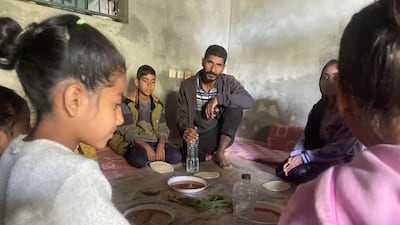Live updates: Follow the latest on Israel-Gaza
The parents of 12 children in Gaza who survived an air strike in the first weeks of the war with Israel have described their agonising struggle to find enough food to live.
Hamad Yousef, 50, his wife Rabab, 40, and their family escaped a strike in Beit Hanoun, on the north-east edge of the Gaza Strip, in November.
Mr Yousef told The National that an Israeli evacuation order that followed the attack forced his family to head south to Deir Al Balah in central Gaza, where they have been ever since.
“Our home got destroyed and we all live in a tent now. We are living in a catastrophic situation. It is beyond imagination,” Mr Yousef said.
Someone from the family must walk for 500 metres every day to a well to get salty water, he added.
“I now watch my children cry from hunger. I see them going to sleep without eating a single meal and I’m powerless to provide anything,” he said. “It's agonising.”

Israel's closure of the Rafah border crossing with Egypt has also left the enclave's 2.3 million population with no escape. The UN, world leaders, and humanitarian organisations have consistently warned there is no safe place for civilians to turn in Gaza.
At first, the Yousefs had no shelter and were sleeping on the pavement, before they moved to a tent too small for their large family.
Mr Yousef also no longer has a regular income, having been a construction worker before the war.
His wife, Rabab, said the first three months after leaving their home were defined by one word: hunger.
“Leaving our home marked the start of our battle to feed our children,” she said. “Aid and food parcels were scarce, with barely enough to sustain us,” she said.
“We face displacement, leaving our house and living in a tent devoid of essentials such as water, food and electricity. It is daily torment.”
Amid the constant struggle for survival, they have found hope and valuable supplies through the American Near East Refugee Aid's tekia (community kitchen) programme.

While Islamic Relief USA funded the community kitchens, Dubai Cares, part of Mohammed bin Rashid Al Maktoum Global Initiatives, also supported American Near East Refugee Aid (Anera) in providing hot meals, food baskets and emergency relief tents as part of its Gaza In Our Hearts campaign.
“Our sustenance now relies solely on the nearby tekia,” Ms Yousef said. “It offers different types of nutritious meals, like beans with rice, peas and potatoes, and sometimes they serve food with meat. My children go every day when the food is cooked. They stand in line and wait.”
She said the moment her children return to her with food in their hands is the most beautiful moment of the day.
Helping thousands
Anera has opened several tekias in Rafah and central Gaza to provide cooked food to thousands of displaced people daily.
“Throughout the holy month of Ramadan, we depended entirely on the tekia’s food,” Ms Yousef added.
“We would gather at the iftar table, thank God, and eat.
“Even before Ramadan, we ate only one meal a day, including my children who are under nine and who require proper nutrition for growth.”
The tekia attended by the Yousef family feeds thousands with fresh, hot meals daily, while Anera’s teams distribute food parcels and vegetable baskets to displaced families every day.

Despite their hardship, the Yousefs are grateful for the help.
“These organisations play a crucial role in aiding displaced individuals like us,” Mr Yousef said.
“Today we received a food parcel of fresh vegetables from Anera. The cost of such a parcel, priced at tens of shekels, is beyond our means amid the current circumstances.
“But our ultimate wish is for this war to end and for us to return home, even if it's in ruins,” Ms Yousef added.
Gaza health authorities say more than 39,100 people have been killed in the enclave since the war began.
Aid is being sent there as part of the UAE's Operation Gallant Knight 3 mission, launched in November.
More than 13,000 tents have been provided for displaced families under the project
How to donate via Dubai Cares
Gaza In Our Hearts is a Dubai Cares’ fundraising campaign that mobilises individuals of all nationalities, as well as businesses and organisations across sectors, to raise funds for the provision of hot meals, food baskets, and emergency shelter tents for the people of Gaza through Anera, Dubai Cares’ implementing partner in Gaza.
People can directly contribute to the campaign by:
- Donating via SMS by texting the word “donation” to 9030, 9090, 9300, 9600 and 9900 to donate Dh30, Dh90, Dh300, Dh600 or Dh900, respectively, through Etisalat by e& and du
- Making online donations at dubaicares.ae
- Launching their own campaign on the Dubai Cares crowdfunding platform
- Making a direct donation through bank deposit to Dubai Cares' account or with a cheque addressed to Dubai Cares.
Dubai Cares will continue to accept donations until the end of the year, while more than Dh10,750,000 has been raised for the people of Gaza in 2024.


